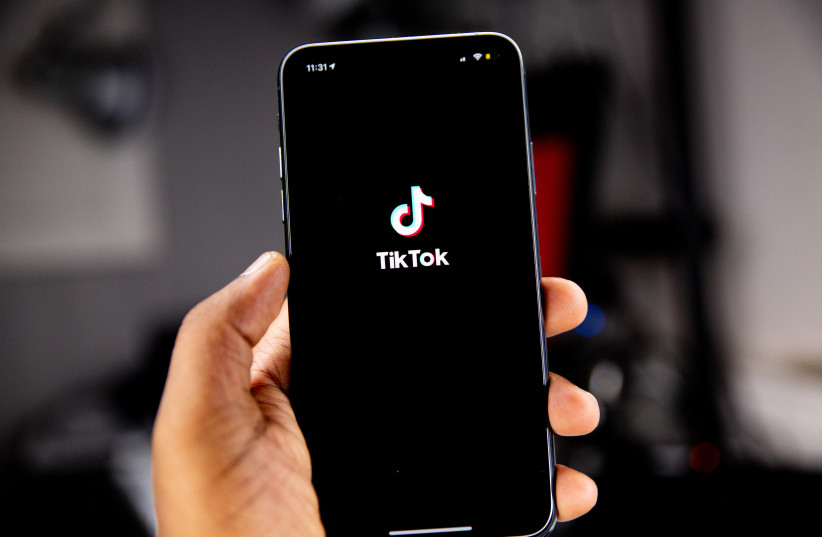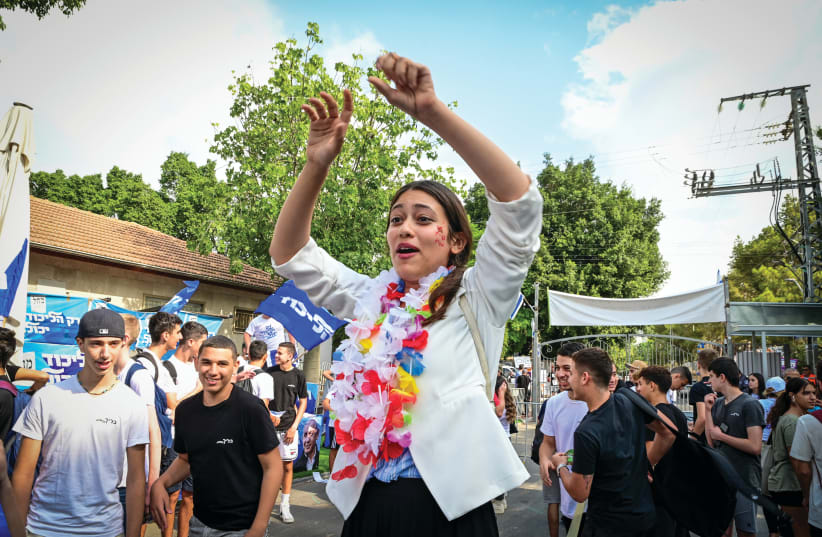One of the most coveted status symbols for any Israeli politician is to be featured in a sketch on Eretz Nehederet, Israel’s most popular satirical TV show for the past two decades.
The show features a regular lineup of impersonations of A-list players, such as Benjamin Netanyahu, Yair Lapid, Naftali Bennett, Benny Gantz and most other party leaders. Other eccentric players, like Likud’s Miri Regev or Dudi Amsalem, often join the cast for guest appearances, but most lawmakers and ministers can spend their entire careers yearning to be ridiculed on the show.
This week, as the show returned for its 20th season, a new character made her debut: Hadar Muchtar is only 20 years old, not even eligible to run for the Knesset, but she is the leader and founder of the Fiery Youth movement. In the past few weeks she has become the buzzword of the fifth election, earning her seat alongside the old-time brass at the popular TV show’s mock VIP table.
Hadar Muchtar's rise to Israeli TokTok political fame
Muchtar is often portrayed as having come out of nowhere, but she is, in fact, the first Israeli TikTok politician. Since the summer of 2020, Muchtar has been posting short and catchy videos protesting corruption and the cost of living, and promoting a direct referendum for crucial decisions affecting the future of the nation and of Generation Z. She has around 85,000 followers, but her viral theatrical videos reach millions of views and viewers, spurring her to announce the establishment of her own party earlier this year, despite the fact she is underage and thus ineligible to run.


She staged a few theatric commotions at some of the Knesset committees and tried to spark a renewed social tent protest along Tel Aviv’s Rothschild Boulevard, home to the 2011 social protest movement which brought hundreds of thousands of young Israelis to the streets. Only dozens arrived this time, but Muchtar had herself filmed in more videos to upload.
When elections were called in late June, Muchtar was unknown to most of the public, certainly among those over the age of 25. In less than three months, she turned into a trending political sensation, evolving from a TikTok influencer to a talk show guest on mainstream media. She has been interviewed repeatedly, by every news outlet that exists, regularly disrupting the conventional back-and-forth with tears and drama – especially when confronted with difficult questions.
Specializing in slogans, poor polls, incredible media attention
Generally speaking, Muchtar is not inclined to answer questions, as the Eretz Nehederet anchor rightly pointed out during her Wednesday night skit. She specializes in screechy slogans, without suggesting any real plans or solutions to the serious problems that she raises.
Perhaps that’s why, despite the grossly inflated media attention, Muchtar’s Fiery Youth hasn’t been doing too well in the polls: Muchtar receives between 0.4% and 1.9% of the vote, far from the 3.25% threshold needed to actually enter the Knesset. Nevertheless, even though she herself is ineligible to run and has registered a group of anonymous candidates on her list instead, she has been given screen time that is wildly disproportionate to her actual support and influence.
Comparing Hadar Muchtar with Israeli right-wing firebrand Itamar Ben-Gvir
Other struggling candidates battling the threshold, such as former Yisrael Beytenu member Eli Avidar or the economist Yaron Zelekha, could only dream about achieving Muchtar’s TV recognition, which competes with that of Interior Minister Ayelet Shaked, an experienced and veteran studio sweetheart, and with that of right-wing firebrand Itamar Ben-Gvir, who also starred on Eretz Nehederet, appearing with Netanyahu (via actors impersonating them) in the main musical act, singing his gratitude to TV channels for turning him into a star, to the tune of “Springtime for Hitler” from the Broadway and Hollywood musical The Producers.
No matter how pointedly the TV satire mocked and criticized the media for whitewashing him, Ben-Gvir’s very appearance on the show marked another step in his legitimization, into the heart of family prime-time consensus.
Muchtar, like Ben-Gvir, has been feeding the beast of Israeli media and their constant hunger for thrill and excitement to fill hours of endless news broadcasts and talk shows, which feed her back with short clips to post on TikTok. It’s an unbreakable cycle, which is likely to be researched as a case study in politics in the digital era, but is also a symptom of election fatigue, reflecting a desperate public yearning for something new that would shake things up and break the ongoing political deadlock.
The scams and scandals around Hadar Muchtar
FOR WEEKS, strategists and panelists were wondering whether Muchtar was the leader of a potential protest party that would revive the surprising success of the mythological Pensioners Party in the 2006 elections, in which it won seven seats. But with the limelight came scrutiny and audit, which exposed Muchtar in a series of scams and lies about her past and present, threatening to end the romance between her and the TV presenters.
Muchtar’s missteps started last week, when a Channel 13 hidden camera documented a declaration of support for Netanyahu, undermining public statements that refused to pick a side between the pro- and anti-Bibi camps. Then, after accusing the ultra-Orthodox establishment of distributing pamphlets against her, Israel Hayom revealed that she herself printed them, and her party activists were hanging them in the streets.
The following day she was ambushed on camera, by the former No. 2 in Fiery Youth, who accused her of being a puppet controlled and supported by a big business tycoon as well as powerful politicians, from the anti-Bibi bloc.
This week started with another severe blow for Muchtar, who was shamed by a fellow right-wing social media influencer who revealed a document proving that she owns her own apartment, contradicting her main campaign talking point about the housing crisis and how she will never be able to get a flat.
Muchtar’s background has remained quite enigmatic so far. She adamantly denied any high-end, powerful funding or establishment support, and her parents, who supposedly do not encourage her political endeavor, have tried to stay out of the spotlight.
But her failed handling of the secret flat crisis inevitably dragged them in: as she scrambled through interviews and explained that they are the real owners, and the flat is only registered in her name, the tax authorities launched an investigation into the purchase of the family apartment.
The accumulating crises made Muchtar announce a boycott on establishment media, but she still made it to Eretz Nehederet, where she was ironically crowned by “Netanyahu” as a “natural politician, because every time she opens her mouth – comes out a lie”.
There is still much mystery about Muchtar’s dramatic spike to the top of the agenda, and who assisted her behind the scenes and how. The anti-Netanyahu camp suspects she is a Likud campaign manipulation project. Right-wing influencers are defaming her allegations of connections to Lapid and Gideon Sa’ar.
Her shallow slogan shouting and recurring lies have turned her into one of the most hated people on Twitter. After going from rags to riches and back to rags, Muchtar has passed her peak in this round. But she is probably not going away, only waiting until she becomes legal.
The phenomenon she represents should not be neglected. TikTok is the new political frontier, where masses of Gen Z youngsters worldwide are receiving their information, education and manipulation. Vitalizing their positions and concerns will eventually challenge the old-school establishment.
